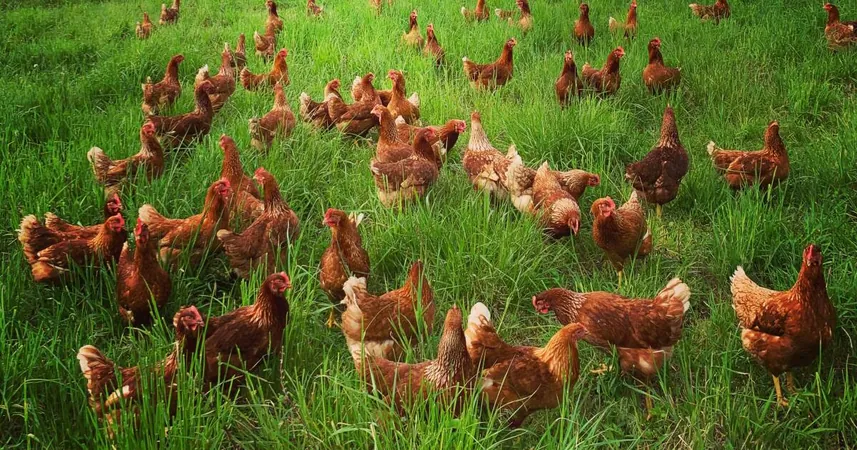
Massachusetts Faces Bird Flu Crisis: Farmers on High Alert as Cases Rise Among Wildlife
2025-01-29
Author: Ming
Massachusetts Faces Bird Flu Crisis
Massachusetts is grappling with a surge in bird flu cases, particularly affecting wild and backyard birds. Poultry farmers across the state are heightening their biosecurity measures to protect their flocks after multiple infections were reported.
Recent Tests and Confirmations
Recent tests revealed the avian influenza virus, scientifically termed H5N1, contributed to the tragic deaths of a significant number of birds, specifically in regions like Plymouth, Boston, and near the UMass Amherst campus. The Massachusetts Division of Fisheries and Wildlife confirmed preliminary positive cases have emerged in additional locations, raising alarms about the potential spread of the disease.
Outbreak Details
The outbreak at Billington Sea in Plymouth resulted in the death of over 60 Canada geese, ducks, and swans. Wildlife officials have urged residents to steer clear of any sick or deceased birds and to keep domestic birds secured to limit transmission. Ashley Randle, commissioner at the Massachusetts Department of Agricultural Resources, emphasized that wild birds are primary carriers of the virus. 'The way that it’s spread to domestic poultry is through their feces, whether it’s dropped into the water source or their feed source or in the backyard,' Randle explained.
Risk to Humans
Despite the alarming developments in bird populations, health authorities stress that the risk to humans remains low. The Centers for Disease Control and Prevention (CDC) and the state Department of Public Health are actively monitoring the situation and preparing for any potential threats. This includes maintaining a stockpile of protective equipment and testing supplies. To date, the United States has reported 67 confirmed human cases of bird flu, including one fatality involving a person with underlying health issues. Notably, there have been no human infections recorded in Massachusetts so far.
Impact on Farmers
However, the virus’s consequences extend beyond health concerns; it is significantly impacting local farmers. Vincent Frary, who operates Copicut Farms in Dartmouth, voiced that the ongoing situation is a major concern for their business. With 15,000 chickens that collectively produce up to 90 dozen eggs daily, the threat of an infection poses a dire risk. Frary mentioned his efforts to secure their coops against wild birds, which can introduce the virus.
Prevention Measures for Farmers
To counter the threat, Randle advised farmers to keep their birds indoors and implement rigorous hygiene practices, such as disinfecting footwear before entering coops and restricting visitor access to farms. If Frary's chickens were to contract the virus, he could face the grim prospect of having to cull his entire flock and missing a critical poultry growing season.
Concerns Across the Region
Farmers across the region are feeling the weight of these precautionary measures. Nancy Hubbard, a fifth-generation farmer at Hubbard’s Farm LLC in Princeton, noted that the 2022 bird flu outbreak prompted her to stop raising chickens altogether due to the risk of losing her entire flock if the birds were exposed to the virus during transport for slaughter.
Consumer Impact
The ramifications of the bird flu crisis are spilling over to consumers as well. With major poultry farms affected, grocery stores are struggling to keep eggs stocked, and prices have soared, with some retailers pricing eggs near $9 per dozen. Randle confirmed that the industry has lost over 137 million birds from the food supply, which directly impacts egg production and availability.
Dairy Cows and New Concerns
As 2024 approaches, an unsettling development has emerged; infections of avian influenza were reported in dairy cows across various states, raising concerns among dairy farm workers. The Massachusetts Department of Agricultural Resources and the Department of Public Health are collaborating to test milk from local dairy farms, but thus far, there is no evidence of infected cows in Massachusetts.
Conclusion
As the situation evolves, the collective efforts of farmers, health officials, and consumers will be critical in navigating this challenging crisis. Stay informed to see how these developments could affect your daily life and the local economy!


 Brasil (PT)
Brasil (PT)
 Canada (EN)
Canada (EN)
 Chile (ES)
Chile (ES)
 Česko (CS)
Česko (CS)
 대한민국 (KO)
대한민국 (KO)
 España (ES)
España (ES)
 France (FR)
France (FR)
 Hong Kong (EN)
Hong Kong (EN)
 Italia (IT)
Italia (IT)
 日本 (JA)
日本 (JA)
 Magyarország (HU)
Magyarország (HU)
 Norge (NO)
Norge (NO)
 Polska (PL)
Polska (PL)
 Schweiz (DE)
Schweiz (DE)
 Singapore (EN)
Singapore (EN)
 Sverige (SV)
Sverige (SV)
 Suomi (FI)
Suomi (FI)
 Türkiye (TR)
Türkiye (TR)